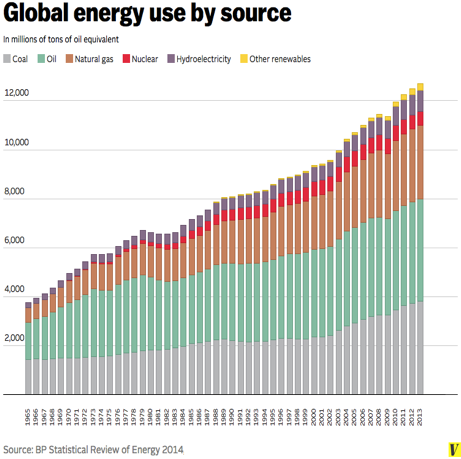Current energy sources, problems and volumes.
Fossil fuels such as oil, gas and coal are currently cheap, they can be stored and they pollute, not just during combustion but also extraction. Oil fields, coal mines, quarries, fracking, etc. create major pollution in natural environments. Fossil fuels are not found everywhere; they are an economic natural and power resource in a small number of countries. Current production volumes of fossil fuels will gradually decline and become more and more expensive, especially oil and gas. Fossil fuels account for approx. 80% of the world’s energy and are increasing in volume rapidly every year.
Hydro power is usually quite cheap and storable. The enormous dams have a dramatic, irreparable impact on nature. There is a degree of risk that dams may burst. Hydro power is limited, a natural and power resource in a small number of countries. Hydro power currently accounts for around 6–7% of global energy production.
Wind and solar energy are expensive and provide no energy when the wind isn’t blowing or the sun isn’t shining. The energy must be consumed immediately. Wind and solar energy exist to varying degrees in all countries. Production of energy via wind and sun is marginal, accounting for around 4% of global energy consumption. In practice, wind power has proven to have a very short lifespan—only 15 to 20 years—which means new wind turbines must constantly be built.
Biofuels are expensive and are far from being feasible replacements for oil, gas and coal, as the earth’s arable space has essentially already been used, primarily to produce food for a growing population. Biofuels give carbon dioxide and produce enormously more atmospheric pollution during combustion than, for example, gas. The most dangerous aspect is probably the vast amount of nano particles. Biofuels, forests, are not found in all countries, forest is a natural and power resource in some countries. Biofuels, wood and waste, account for around 2.5% of global energy production.
Nuclear power can be stored and is relatively cheap because the lifespan is 60-80 years. Uranium mining is associated with major risks. Nuclear power production can involve meltdowns and the material is used to make nuclear weapons. One unsolved problem is the disposal of nuclear waste. Nuclear waste has to be stored for up to 100,000 years. There are already hundreds of thousands of tonnes of nuclear waste all around the world that have not yet been disposed of. Nuclear power is therefore a major source of concern for many people. Uranium is found in a small number of countries, a natural and power resource. Nuclear power accounts for around 4–5% of global energy production.
Geothermal energy, which can be used for heating and also converted into electricity, is an old technology that, thanks to modern deep-drilling methods, has started to become a viable alternative—especially now that energy has become more expensive.
HyMeAir now presents a new, unique invention: the use of Nano Towers to capture hydrogen and methane from the air. This energy source, ordinary air, can probably replace all other energy sources and solve the world’s energy, climate and environmental problems. In the best case, HyMeAirs new technology could give us almost free energy, virtually free of emissions and storable. The invention is, like the best inventions, simple, by using new technology, nano filters in Nano Towers, that can filter out the methane and hydrogen contained in the air when the wind blows. This could, for example, involve a combination tower for both methane and hydrogen, or separate Nano Towers for each individual gas that we wish to extract.
Here we can see how the different energy sources are developing. The world constantly needs more energy, and in 2024, oil, gas, and coal accounted for 80% of the world’s energy demand:
